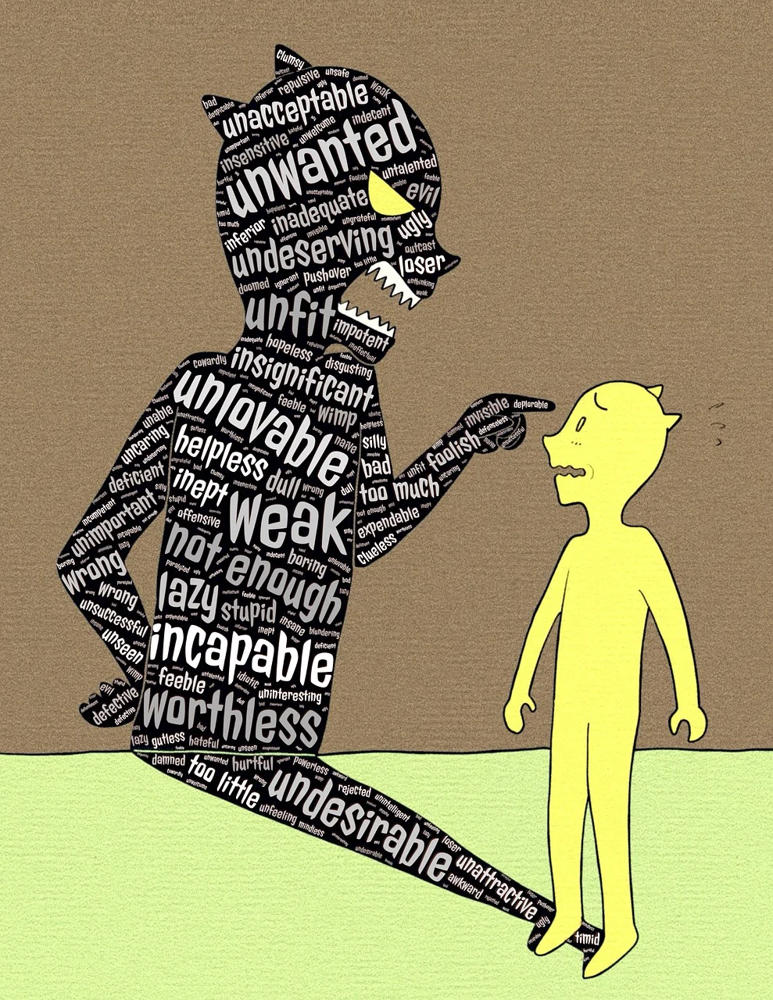By Katherine Jewett, LMFT
Introduction
Ever notice that voice in your head that sounds suspiciously like Regina George from Mean Girls or maybe Professor Snape from Harry Potter? Meet your inner critic—the uninvited guest at your mental party who constantly whispers things like, “You’re going to embarrass yourself,” or “You’ll never be good enough.”
This critical voice evolved as an overly protective mechanism designed to help humans avoid mistakes and social rejection. But today, rather than keeping you safe, it often leaves you feeling anxious, perfectionistic, and insecure. Think of your inner critic as a guardian with good intentions but terrible tactics.
How to Recognize Your Inner Critic
Your inner critic often speaks up during moments of anxiety, self-doubt, or when perfectionism rears its stressful head. Common phrases include:
- “I’m not good enough.”
- “Everyone else is doing better.”
- “I’m bound to fail.”
Do these lines sound familiar? That’s classic inner critic territory. Let’s meet a few common inner critic personalities:
- The Overachiever Taskmaster: This inner critic believes anything less than perfection is a failure, much like Snape sneering, “Obviously, you’ve failed again.”
- The Comparison Queen/King: Constantly measuring you against others, it whispers, “Why can’t you be more like them?”
- The Doom Prophet: Your personal Chicken Little, convinced the sky is perpetually falling, warning, “If you try, you’ll humiliate yourself.”
Recognizing these personas helps you spot when the critic takes over, empowering you to respond differently.
Check out How to Recognize your Inner Critic for more.
How to Conquer Your Critical Inner Voice
Ready to reclaim your headspace? Here are powerful and fun strategies to silence that nagging voice:
1. Reframe Its Messages
Turn negative statements into compassionate truths. When you hear, “You’re not good enough,” flip it to, “I’m learning, and that’s okay.” Transform harsh judgments into supportive encouragements.
2. Name and Personify It
Give your critic a silly name—like Negative Nancy or Critical Kevin. By personifying it, you create distance. Next time “Nancy” criticizes your choices, you can gently (or humorously) dismiss her, saying, “Thanks, Nancy, but I’ve got this!”
3. Use Humor to Diffuse It
Humor deflates the critic’s power. Imagine your critic delivering its harsh lines with a funny voice—perhaps Mickey Mouse or a talking cactus wearing a tutu. Laughter makes the intimidation become absurd.
4. Challenge Its Lies with Facts
Treat your critic’s bold claims as hypotheses, not facts. When it says, “You’ll never succeed,” ask yourself for evidence. Has there ever been a time you did succeed? Usually, the critic exaggerates negativity, which you can calmly counter with reality.
5. Practice Mindfulness and Self-Compassion
Mindfulness allows you to notice critical thoughts without judgment. Label them as mere thoughts—not truths. Pair this with self-compassion: speak to yourself as you’d comfort a dear friend. If you wouldn’t say it to someone you love, don’t accept it yourself.
Empowering Conclusion
Remember, your inner critic isn’t you—it’s a misguided protector trying too hard to keep you safe. You can acknowledge its presence without letting it run your life. Treat yourself with kindness, humor, and empathy. The next time your critic speaks up, imagine swapping its harshness with the encouraging voice of someone like Ted Lasso, reminding you that you’re more than capable and always worthy of compassion.
Take Action
Your inner critic isn’t your enemy—it’s an overly cautious advisor. You have the power to acknowledge it without letting it dominate. Ready to quiet your inner critic and reclaim your confidence? Reach out and schedule a complimentary consultation today—I’m here to help you rewrite your inner narrative and empower your journey toward self-acceptance and resilience.
You might also like How To Love Yourself When You Were Never Taught How











